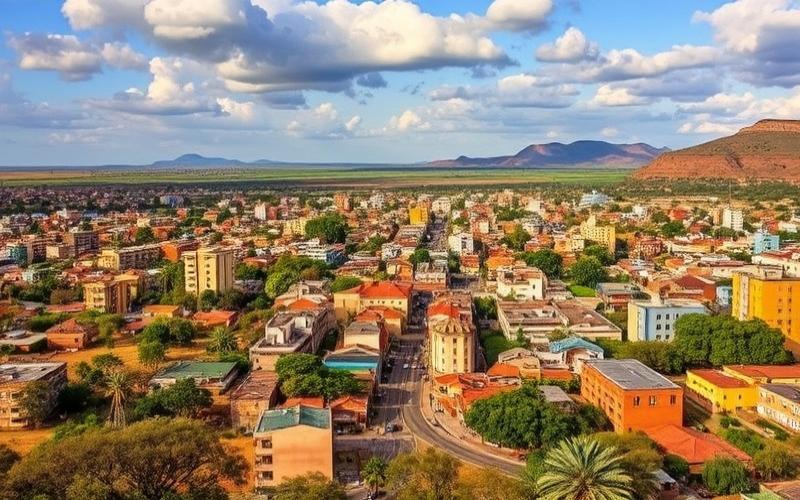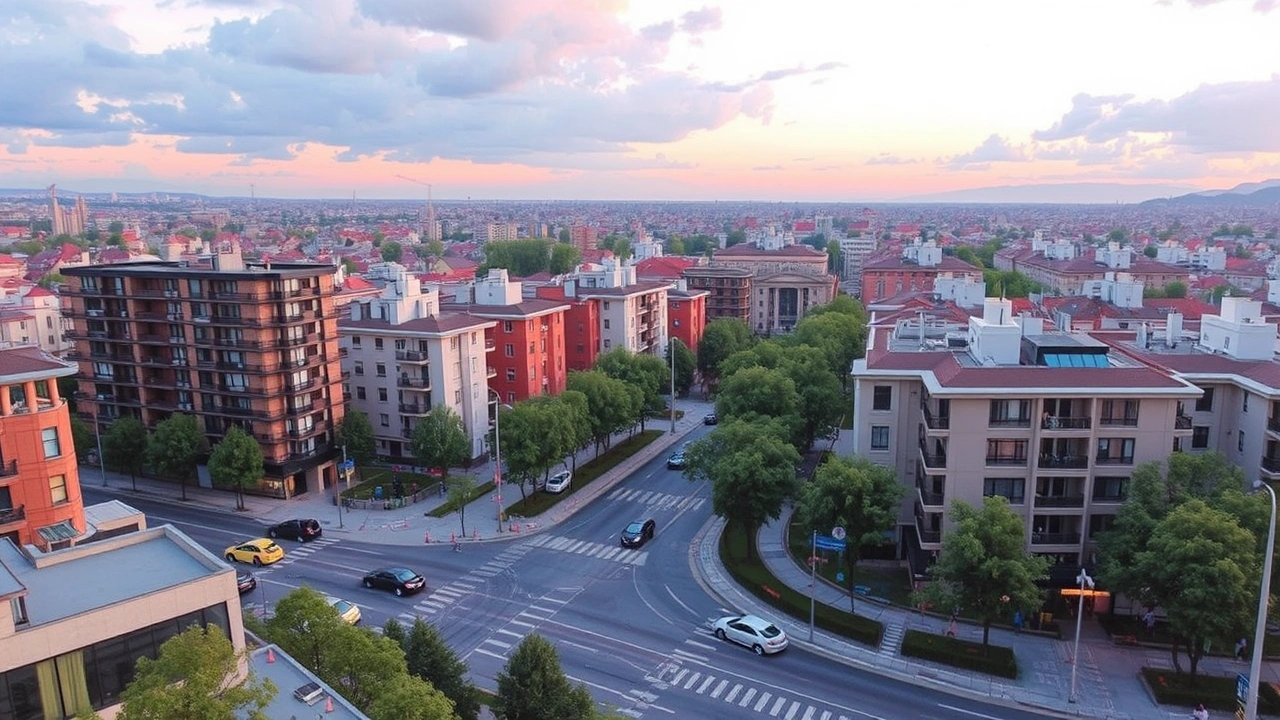
 Published on and written by Cyril Jarnias
Published on and written by Cyril Jarnias
South Africa, with its spectacular landscapes and rich cultural mosaic, is an appealing destination for many European expatriates. However, European Union citizens considering relocating there should be aware of the unique advantages their status provides, particularly regarding specific rights and freedoms. These privileges can not only enhance their daily experience but also offer a protective framework against certain local uncertainties. Through this article, discover how EU nationals can leverage these assets in South Africa, transforming their stay into a rewarding and secure adventure.
EU Advantages for Expatriates in South Africa
Main advantages that the European Union offers to expatriates living in South Africa:
- Access to social and economic rights
- Ability to work in all economic sectors without restriction.
- Right to open and manage a business.
- Simplified access to real estate ownership.
- Access to the South African public system, including public healthcare and education for the entire immediate family.
- Potential eligibility for social assistance intended for permanent residents.
| Social Benefits | Main Details |
|---|---|
| Public Health | Access to the South African public system |
| Education | Possible enrollment for children at all school levels |
| Family Cohesion | Facilitated family reunification (spouse, children) |
- Consular Protection
- European citizens can request assistance or consular protection from their home country’s embassies. In their absence, they benefit from the European right to seek help from any other diplomatic or consular representation of an EU Member State.
- Bilateral agreements facilitating commercial and professional exchanges
- The EU-SADC Economic Partnership Agreement has completely or partially eliminated customs duties on nearly 99% of South African imports to the EU, thereby encouraging bilateral trade and facilitating European foreign direct investments (47% of FDI in South Africa comes from the EU).
Facilities offered by these agreements:
- Near-total elimination of customs barriers on many commercial exchanges
- Increased mutual recognition for certain professional qualifications
- Promotion of European establishments through a stabilized regulatory environment
- European cooperation and development aid programs
European citizens present locally can:
- Actively participate in projects funded by the European Union (education, health, innovation)
- Indirectly benefit from the massive financial support provided by Team Europe (nearly eight billion euros redirected to the African continent in recent years), particularly in the fight against COVID-19 or agricultural development
- Join/create associations supported by European or international institutional funds
Non-exhaustive list of concrete examples:
- Material aid (e.g., medical supplies during COVID)
- Structural funding for Franco-European local NGOs
- Logistical support during major cultural events led by the expatriate community
- Administrative facilities for travel and settlement
For nationals holding a European passport:
- Simplified procedure to obtain a long-stay visa/work permit/permanent residence if criteria are met
- No systematic requirement for annual renewal of professional permit once a permanent resident
Active defense of interests via European delegations
Official EU delegations play a central role:
- Legal monitoring of respect for human/fundamental rights concerning their nationals
- Constant dialogue with local authorities during administrative/consular disputes involving Europeans
- Direct support/institutional contribution to community initiatives sustainably structuring local European associative life
In summary, thanks to the dense institutional network between the EU and South Africa combined with an ambitious policy both commercial and social/cultural, European expatriates benefit not only from facilitated professional/social integration, but also from enhanced protection, as well as multiple opportunities related to community cooperative programs.
Good to know:
European expatriates in South Africa benefit from EU consular protection, bilateral agreements promoting professional exchanges, and simplified access to social and economic rights, as well as various cooperation and development aid programs. EU delegations play a key role in defending the rights and freedoms of European citizens, ensuring increased freedom of travel and settlement.
Freedom of Movement for EU Citizens
The freedom of movement within the European Union is based on the fundamental right for any EU citizen to move, reside, work, and study freely in any Member State. This principle is enshrined in European treaties (Article 3 TEU, Article 21 TFEU) and the Charter of Fundamental Rights. Directive 2004/38/EC details these rights for citizens and their families.
Main benefits for EU citizens:
- Live in another member country without major restriction.
- Seek employment and work without a specific permit.
- Enroll in a university or follow vocational training.
- Access the same social or tax benefits as nationals of the host country.
- Transfer certain social rights (health insurance, pension).
| Right | Main Conditions | Possible Limitations |
|---|---|---|
| Reside | Sufficient resources, health insurance (for inactive persons) | Prevent burden on the social system |
| Work | No permit needed | Public policy, national security |
| Study | Possible enrollment | Health insurance required |
The Schengen Area reinforces this freedom by removing systematic border controls at internal borders between its members.
Extension Outside the EU: Agreements with Third Countries
Freedom of movement does not automatically apply outside the EU. However, certain bilateral agreements facilitate the professional or academic mobility of Europeans to third countries like South Africa.
Examples of relevant agreements:
- Bilateral agreements on the mutual recognition of professional qualifications.
- Facilitation of obtaining specific visas for studies or skilled employment.
Specifically concerning South Africa:
- There is no general agreement equivalent to Schengen or EU-South Africa free movement.
- Certain regulated professions may be subject to sectoral agreements recognizing diplomas or allowing temporary practice under local conditions.
Limitations Outside the EU:
European citizens are subject to:
- Prior obtaining of an appropriate visa (work, study…).
- Compliance with South African immigration laws: possible professional quotas; language requirements; local tax obligations…
In case of a specific bilateral agreement:
Possible additional rights:
- Simplified procedure to obtain a residence/work permit
- Faster recognition of diplomas
Possible additional duties:
- Subscribe to certain local social insurances
- Regularly justify one’s activity to the host authorities
Impact on Daily Life in South Africa:
For a European expatriate fully benefiting from the freedoms offered by these mechanisms:
- Increased ease in professional integration thanks to better academic/professional recognition
- Greater possibility for their family to access family reunification
- Facilitated geographical mobility between Europe and Southern Africa
On both personal and professional levels:
- Experience enriched by facilitated cultural mixing,
- Increased opportunities in international development,
- Potential access to local associative/European networks supporting integration and mutual aid.
Key takeaway: The actual scope always depends on both individual status and the applicable legal framework between partner states – no automaticity outside the EU/EEA area.
In summary:
- European freedoms offer great flexibility within Europe but remain conditional when settling outside the European Union;
- Targeted agreements can mitigate certain constraints but also impose their own limits;
- These mechanisms nevertheless significantly contribute to enriching both the personal and professional lives of European expatriates settled in South Africa.
Good to know:
EU citizens benefit from freedom of movement within Member States, but when in South Africa, they must often comply with specific visa and residence conditions, although bilateral agreements can offer additional advantages, such as the recognition of certain professional qualifications. Expatriates in South Africa may nevertheless encounter limitations, particularly regarding the duration of stay without a visa, which impacts their lifestyle and requires prior planning.
European Rights Abroad in South Africa
The Trade, Development and Cooperation Agreement (TDCA) between the European Union and South Africa constitutes the main legal foundation guaranteeing certain rights to European citizens residing in South Africa. This framework is complemented by the Cotonou Agreement which links South Africa to the EU via the ACP group.
| Agreement | Main Purpose | Rights Guaranteed to European Citizens |
|---|---|---|
| TDCA | Trade liberalization, political cooperation and development | Facilitation of residence, work, investment conditions; protection in commercial relations; dialogue for human rights |
| Cotonou Agreement | Free trade between EU and ACP countries | Facilitated access to the local market; possibility to invest and work in certain sectors |
Work-Related Rights
- Agreements support the creation of local jobs as well as European presence in the South African market.
- Expatriates can be hired by European or South African companies according to local legislation.
- Access to certain jobs may require a work permit issued by South African authorities.
- Respect for international social standards (non-discrimination, pay equality) is encouraged by these partnerships.
Right of Residence
- Prolonged residence requires an appropriate visa (temporary or permanent residence).
- Agreements sometimes facilitate administrative procedures for European nationals employed locally or investing in the country.
Access to Public Services: Health & Education
- Access to public health generally depends on migration status: only those with a valid permit can claim partial coverage.
- Public education is accessible under regular residence conditions; however, some schools impose specific fees for foreigners.
Necessary Conditions to Benefit from Rights
Administrative Obligations:
- Prior obtaining of an appropriate visa (work, investment, family reunification).
- Justification to local authorities of European status during specific requests.
Respect for Local Law:
- Strict application of South African law in tax, social, and migration matters.
- Compliance with all procedures related to renewal/extension of stay or professional permit.
Potential Limitations & Obligations
- Certain jobs remain primarily reserved for nationals according to local legislation (“South Africanisation”).
- Obligation of private medical insurance to fully access certain hospital care outside vital emergencies.
- Possible exclusion from public university scholarships primarily intended for local citizens.
Available Recourses in Case of Non-Compliance
In case of administrative dispute or discrimination:
- Direct recourse to:
- European embassies/consulates present on site
- Competent local courts
- Possible support via the European delegation installed in South Africa
- Potential mobilization of international organizations defending human rights
To guarantee their rights:
- Expatriates must keep all official documents related to their legal status;
- They are encouraged to regularly contact European diplomatic representations;
Bilateral agreements ensure a high but variable level depending on the economic or social sector—the concrete application also largely depends on national policies periodically adopted by Pretoria.
Good to know:
Strategic partnership agreements between the EU and South Africa facilitate the recognition of European professional qualifications and access to public services such as health and education, while imposing formalities to ensure respect for rights, with possible recourse in case of non-compliance. Expatriates must ensure they possess a valid residence permit to benefit from all work and public service rights, and regularly check conditions to prevent any disagreement.
Disclaimer: The information provided on this website is for informational purposes only and does not constitute financial, legal, or professional advice. We encourage you to consult qualified experts before making any investment, real estate, or expatriation decisions. Although we strive to maintain up-to-date and accurate information, we do not guarantee the completeness, accuracy, or timeliness of the proposed content. As investment and expatriation involve risks, we disclaim any liability for potential losses or damages arising from the use of this site. Your use of this site confirms your acceptance of these terms and your understanding of the associated risks.
























































